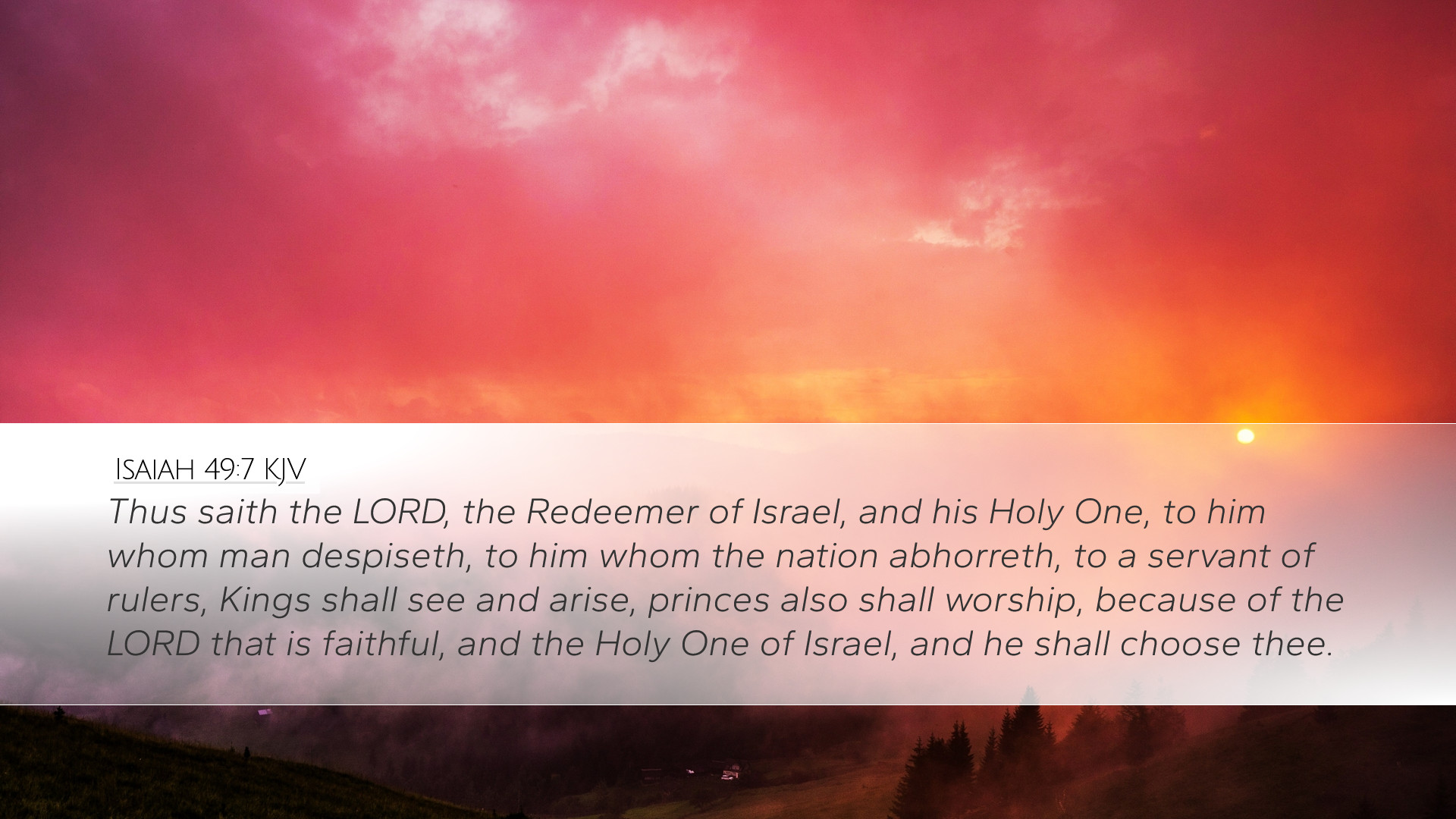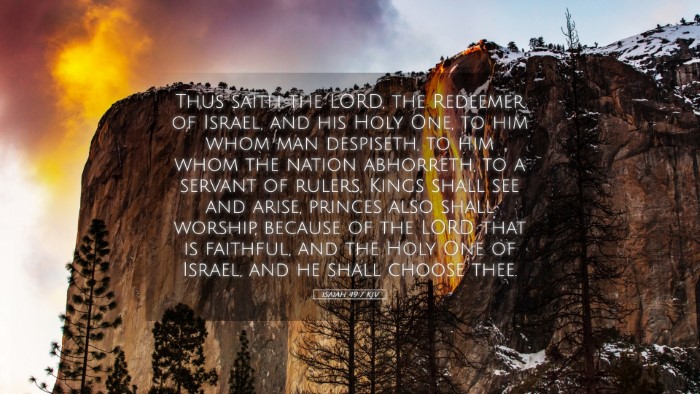Commentary on Isaiah 49:7
Verse: Isaiah 49:7 - "Thus saith the Lord, the Redeemer of Israel, and his Holy One, to him whom man despiseth, to him whom the nation abhorreth, to a servant of rulers, Kings shall see and arise, princes also shall worship, because of the Lord that is faithful, and the Holy One of Israel, and he shall choose thee."
Overview
This remarkable verse encapsulates key themes in the book of Isaiah, particularly the dual nature of the Servant of the Lord — both despised and ultimately exalted. The passage serves as a microcosm of the prophetic tradition, wherein the faithful are often marginalized by human society but vindicated by divine assurance.
Exegesis and Theological Insights
-
Matthew Henry's Commentary:
Henry posits that the text serves as a reminder of God's unwavering commitment to Israel, emphasizing that even when His chosen servant is rejected by men, God’s purpose prevails. The phrase "to him whom man despiseth" resonates deeply, pointing to Jesus Christ, who would later face similar disdain from the very people He came to save. Henry stresses the profound truth that rejection from men does not equate to divine abandonment.
-
Albert Barnes' Notes:
Barnes provides a thorough exploration of the identity of the Servant referenced in Isaiah 49:7. He suggests that the ‘Servant’ represents not only individual leaders (like Cyrus) but also the collective body of Israel. His understanding includes interpretations aligning with messianic expectations, ultimately seeing this as prophetic of Christ’s suffering and subsequent glory. The juxtaposition of "despised" and "exalted" illustrates a key theological motif — that divine deliverance often comes through suffering and rejection.
-
Adam Clarke's Commentary:
Clarke highlights that the verse speaks to the unrecognized worth of the servant. He notes the term "abhorreth," translating to a strong disfavor, indicative of the trials both Israel and Christ would endure. Clarke emphasizes the implications of kings and princes ultimately paying honor, illustrating a profound turn of events where recognition and reverence emerge from initially unawarded disdain. This presents an anticipation of the eventual recognition of Christ's authority and the global bowing before Him in worship.
Thematic Exploration
This verse speaks volumes about God's redemptive plan. Three themes particularly stand out:
- Divine Rejection and Human Accountability:
The idea that those chosen by God may face rejection from the world is reiterated throughout scripture. Isaiah brings this to a personal level for the reader, encapsulating the experience of many believers. Rejection is not a sign of failure; rather, it may highlight one's fidelity to God’s calling.
- Transformation of Status:
The transition from being despised to being honored underlines the biblical narrative of God's justice. It prepares the way for hope — though the servant seems disregarded, the day comes when authority figures will recognize their value, pointing to a future where Christ reigns supreme.
- Faithfulness of God:
The mention of God as the "Holy One" reinforces His faithful nature. Even when circumstances seem bleak, believers are assured that God’s plans are assured. This becomes a cornerstone for understanding faith — trusting in God's character despite visible outcomes.
Application for Modern Believers
For pastors, students, theologians, and scholars, the implications of Isaiah 49:7 are profound:
-
Encouragement in Trials:
This verse provides solace during difficult seasons. The reality of being despised can weigh heavily on believers, yet Isaiah 49:7 reminds them that they share in a legacy of suffering that leads to exaltation.
-
Understanding Vocation:
In ministerial contexts, this verse can serve as a reminder that true Christian leadership may often involve moments of misunderstanding and scorn. The faithful leader, much like the Servant, must remain steadfast in God’s calling, trusting in the eventual recognition of their efforts.
-
Anticipating God’s Sovereignty:
Isaiah’s declaration prompts believers to look forward with hope. It reminds them that while their efforts may seem unappreciated, God’s plan will come to fruition. Personal, societal, and global injustices are seen through the lens of God’s overarching plan.
Conclusion
Isaiah 49:7 captures the essence of the Gospel narrative: rejection paving the way for divine acceptance and glory. Its message is timeless; it speaks to the heart of every follower of Christ, offering the assurance that, though vilified now, they are valuable in the eyes of God. The insights of Matthew Henry, Albert Barnes, and Adam Clarke converge to illuminate the scriptures' depth, prompting an enduring reflection on faith, hope, and the redemptive arc of the Biblical story.


